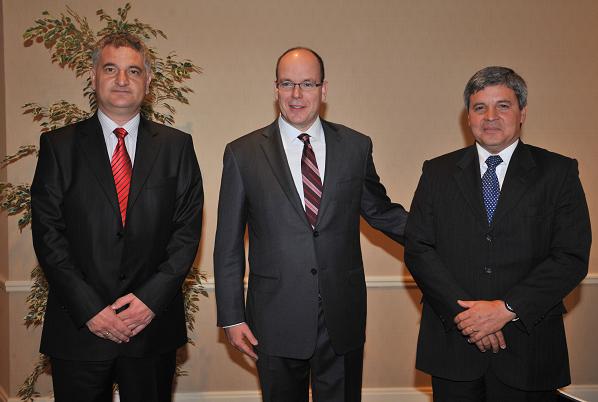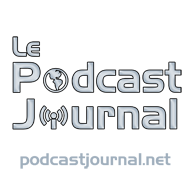Cette réunion sur les typologies, qui résulte du partenariat global unissant le Groupe d’Action Financière et le Comité Moneyval du Conseil de l’Europe dans leur combat contre le blanchiment de capitaux et le financement du terrorisme, sera l’occasion pour les nombreux experts présents d’échanger leurs expériences et leurs points de vue sur les nouvelles méthodes, les nouvelles techniques et les nouveaux vecteurs de blanchiment de capitaux et de financement du terrorisme.
Les débats auront lieu à huis clos.
Les débats auront lieu à huis clos.
Interview de Mr Gilles Tonelli, Conseiller de Gouvernement pour les Finances et l'Economie, Principauté de Monaco
Discours d'ouverture de Vasil Kirov, Président de Moneyval (en anglais)
2008 Joint FATF / MONEYVAL
EXPERTS’ MEETING ON MONEY LAUNDERING
AND TERRORIST FINANCING TYPOLOGIES
Monaco, 24 – 26 November 2008
Your Serene Highness, President of FATF, Co-chairs of the FATF Typologies Meeting, distinguished guests, colleagues,
ladies and gentlemen,
It is a great privilege for me, as Chairman of MONEYVAL, to join the President of FATF in welcoming you all to the 2008 Joint FATF/MONEYVAL Typologies meeting in one of our MONEYVAL member States, the Principality of Monaco.
We are very honoured, your Highness, by your presence with us this morning. I shall try to be brief as we very much look forward to your address.
I would like firstly to add my thanks to your hard-working authorities for hosting this important gathering and for providing us with such an excellent venue for our deliberations this year. It is a tribute to the attraction of Monaco that we have 174 representatives from 50 jurisdictions and 10 international organisations present. Indeed with all that Monaco has to offer outside this room, I hope we can keep our experts focused on the work in hand.
I am sure I need not remind anyone here that MONEYVAL is the monitoring arm of the Council of Europe in anti-money laundering and countering the financing of terrorism.
As you know, the Council of Europe is an intergovernmental Organisation that has been dedicated, since 1949, to upholding human rights, the Rule of Law and pluralist democracy. And the fight against money laundering and financing of terrorism, as the President of FATF has stated, is central to the protection of these fundamental values.
Money laundering threatens the Rule of Law directly. It is well known that it provides organised crime with its cash flow and investment capital and the incentive to commit more proceeds-generating crime, nationally and transnationally.
The Council of Europe is also dedicated to combating terrorism, as terrorism repudiates the values that the Council of Europe stands for and that we all hold dear. To fight terrorism, you must also fight its financing. I remember the words of the Secretary General of the Council of Europe in our Joint FATF/MONEYVAL Plenary in Strasbourg last year, when he reminded us that “terrorists seldom kill for money, but they need money to kill”.
I, as the Chairman of MONEYVAL, of course represent only one element of the Council of Europe’s three tier strategy to combat money laundering and financing of terrorism.
The Council of Europe is a standard setter, a monitor of the standards (through MONEYVAL) and a major provider of technical assistance, often using MONEYVAL reports as blueprints.
The FATF, of course, is the primary global international standard setter.
The Council of Europe, through its Conventions, also plays an important role in cementing major AML/CFT standards into treaty obligations. The 1990 Convention on laundering, search, seizure and confiscation of the proceeds from crime (CETS 141) is ratified by all Council of Europe member States. The 2005 Convention on laundering, search, seizure and confiscation of the proceeds from crime and on the financing of terrorism (CETS 198) came into force in May this year, and we encourage more countries to ratify it in the months to come.
MONEYVAL, as well as being an organ of the Council of Europe, is now one of the oldest of the “FATF style regional bodies”.
We monitor the effectiveness of AML/CFT systems in our countries in the same way as the FATF. We have been pursuing the FATF’s objectives within our membership since 1997, over 3 rounds of evaluations. And now, as an associate member, we are committed to playing a full and active role in the global family of the FATF and its network of regional bodies.
MONEYVAL is now responsible for the evaluation of 29 countries, of which Monaco is a distinguished member. Monaco has participated in our work since 2002. In 2004, with Monaco’s accession to the Council of Europe, we were pleased to welcome Monaco also as a full member of MONEYVAL. I should like to take this opportunity to pay tribute to the important work that SICCFIN does, under the leadership of Madame Picco-Margossian, in the fight against money laundering and financing of terrorism.
Like the FATF, an important part of MONEYVAL’s mandate, is to undertake “typologies” work. Like all practitioners we use jargon, and “typologies” is a form of jargon or shorthand to describe AML/CFT methods and techniques.
Once we identify new AML/CFT trends and technique, we must not keep this information to ourselves. We place important and sensitive obligations on the private sector to make suspicious and unusual transaction reports to our national authorities. The private sector needs to fully understand the developing techniques that are used in order for them to better spot potentially suspicious operations in their daily business. FATF and MONEYVAL typologies reports are or should be required reading for all in the private sector with AML/CFT responsibilities. It is not for nothing that the international standards require FIUs to periodically release reports, which specifically include typologies and trends.
In MONEYVAL, as Mr Rodrigues has said, we recently published our own report on the securities sector. This was based largely on work we did last year within our membership, though with an emphasis on Eastern Europe, in particular.
I am very pleased that this issue is now being taken up in this meeting at a global level – as one of our key findings was that the securities sector is very under-researched from the point of view of money laundering and financing of terrorism. I trust that the work we did will be a useful starting point.
This is the second Joint Typologies meeting we have undertaken with FATF. In 2004, we joined forces for the first time on typologies. On that occasion, we, in MONEYVAL, chose to examine the AML/CFT aspects connected with human trafficking and illegal migration. That report was published by FATF and ourselves. In it, we began to identify the potential vulnerabilities of money service businesses to the money laundering aspects of human trafficking and illegal migration. It is good that this year we are now, in the project being led by MONEYVAL, coming back to the broader vulnerabilities of money service businesses and bureaux de change, as many of these businesses, since 2004, have diversified into new areas, and it is timely to examine the potential risks in this area again.
So I very much look forward to the discussions we will have here in Monaco. And I also look forward to the development, after this meeting, of four valuable new reports, which will broaden our knowledge and better equip us as practitioners to fight money laundering and financing of terrorism even more effectively in future.
Thank you for your attention.
EXPERTS’ MEETING ON MONEY LAUNDERING
AND TERRORIST FINANCING TYPOLOGIES
Monaco, 24 – 26 November 2008
Your Serene Highness, President of FATF, Co-chairs of the FATF Typologies Meeting, distinguished guests, colleagues,
ladies and gentlemen,
It is a great privilege for me, as Chairman of MONEYVAL, to join the President of FATF in welcoming you all to the 2008 Joint FATF/MONEYVAL Typologies meeting in one of our MONEYVAL member States, the Principality of Monaco.
We are very honoured, your Highness, by your presence with us this morning. I shall try to be brief as we very much look forward to your address.
I would like firstly to add my thanks to your hard-working authorities for hosting this important gathering and for providing us with such an excellent venue for our deliberations this year. It is a tribute to the attraction of Monaco that we have 174 representatives from 50 jurisdictions and 10 international organisations present. Indeed with all that Monaco has to offer outside this room, I hope we can keep our experts focused on the work in hand.
I am sure I need not remind anyone here that MONEYVAL is the monitoring arm of the Council of Europe in anti-money laundering and countering the financing of terrorism.
As you know, the Council of Europe is an intergovernmental Organisation that has been dedicated, since 1949, to upholding human rights, the Rule of Law and pluralist democracy. And the fight against money laundering and financing of terrorism, as the President of FATF has stated, is central to the protection of these fundamental values.
Money laundering threatens the Rule of Law directly. It is well known that it provides organised crime with its cash flow and investment capital and the incentive to commit more proceeds-generating crime, nationally and transnationally.
The Council of Europe is also dedicated to combating terrorism, as terrorism repudiates the values that the Council of Europe stands for and that we all hold dear. To fight terrorism, you must also fight its financing. I remember the words of the Secretary General of the Council of Europe in our Joint FATF/MONEYVAL Plenary in Strasbourg last year, when he reminded us that “terrorists seldom kill for money, but they need money to kill”.
I, as the Chairman of MONEYVAL, of course represent only one element of the Council of Europe’s three tier strategy to combat money laundering and financing of terrorism.
The Council of Europe is a standard setter, a monitor of the standards (through MONEYVAL) and a major provider of technical assistance, often using MONEYVAL reports as blueprints.
The FATF, of course, is the primary global international standard setter.
The Council of Europe, through its Conventions, also plays an important role in cementing major AML/CFT standards into treaty obligations. The 1990 Convention on laundering, search, seizure and confiscation of the proceeds from crime (CETS 141) is ratified by all Council of Europe member States. The 2005 Convention on laundering, search, seizure and confiscation of the proceeds from crime and on the financing of terrorism (CETS 198) came into force in May this year, and we encourage more countries to ratify it in the months to come.
MONEYVAL, as well as being an organ of the Council of Europe, is now one of the oldest of the “FATF style regional bodies”.
We monitor the effectiveness of AML/CFT systems in our countries in the same way as the FATF. We have been pursuing the FATF’s objectives within our membership since 1997, over 3 rounds of evaluations. And now, as an associate member, we are committed to playing a full and active role in the global family of the FATF and its network of regional bodies.
MONEYVAL is now responsible for the evaluation of 29 countries, of which Monaco is a distinguished member. Monaco has participated in our work since 2002. In 2004, with Monaco’s accession to the Council of Europe, we were pleased to welcome Monaco also as a full member of MONEYVAL. I should like to take this opportunity to pay tribute to the important work that SICCFIN does, under the leadership of Madame Picco-Margossian, in the fight against money laundering and financing of terrorism.
Like the FATF, an important part of MONEYVAL’s mandate, is to undertake “typologies” work. Like all practitioners we use jargon, and “typologies” is a form of jargon or shorthand to describe AML/CFT methods and techniques.
Once we identify new AML/CFT trends and technique, we must not keep this information to ourselves. We place important and sensitive obligations on the private sector to make suspicious and unusual transaction reports to our national authorities. The private sector needs to fully understand the developing techniques that are used in order for them to better spot potentially suspicious operations in their daily business. FATF and MONEYVAL typologies reports are or should be required reading for all in the private sector with AML/CFT responsibilities. It is not for nothing that the international standards require FIUs to periodically release reports, which specifically include typologies and trends.
In MONEYVAL, as Mr Rodrigues has said, we recently published our own report on the securities sector. This was based largely on work we did last year within our membership, though with an emphasis on Eastern Europe, in particular.
I am very pleased that this issue is now being taken up in this meeting at a global level – as one of our key findings was that the securities sector is very under-researched from the point of view of money laundering and financing of terrorism. I trust that the work we did will be a useful starting point.
This is the second Joint Typologies meeting we have undertaken with FATF. In 2004, we joined forces for the first time on typologies. On that occasion, we, in MONEYVAL, chose to examine the AML/CFT aspects connected with human trafficking and illegal migration. That report was published by FATF and ourselves. In it, we began to identify the potential vulnerabilities of money service businesses to the money laundering aspects of human trafficking and illegal migration. It is good that this year we are now, in the project being led by MONEYVAL, coming back to the broader vulnerabilities of money service businesses and bureaux de change, as many of these businesses, since 2004, have diversified into new areas, and it is timely to examine the potential risks in this area again.
So I very much look forward to the discussions we will have here in Monaco. And I also look forward to the development, after this meeting, of four valuable new reports, which will broaden our knowledge and better equip us as practitioners to fight money laundering and financing of terrorism even more effectively in future.
Thank you for your attention.

Discours d'ouverture de SAS le Prince Albert II de Monaco
Monsieur le Ministre,
Messieurs les Présidents,
Monsieur le Directeur des Services Judiciaires,
Monsieur le Conseiller de Gouvernement,
Madame le Directeur du SICCFIN,
Mesdames et messieurs,
Chers amis,
Permettez-moi tout d’abord de vous dire combien je me réjouis d’accueillir aujourd’hui votre réunion à Monaco.
Je tiens en particulier à saluer MM. Antonio Gustavo RODRIGUES et Vasil KIROV dont la présence parmi nous souligne l’importance de ce rendez-vous international.
La lutte contre le blanchiment, et le financement du terrorisme qu’il permet, sont pour moi des priorités. Dans un domaine éminemment sensible, qui concentre légitimement l’attention de tous, je sais que Monaco, comme l’ensemble de ses partenaires, se doit d’être irréprochable.
Car je n’oublie jamais que ces enjeux vont au-delà de seules questions financières.
C’est pourquoi j’ai tenu à ce que cette rencontre ait lieu ici, à Monaco, prolongement des efforts importants menés par mon Gouvernement en la matière.
Je ne vais pas retracer maintenant l’ensemble des mesures prises dans le cadre de cette politique volontariste.
Je voudrais néanmoins rappeler que les évolutions législatives et réglementaires récentes ont permis à Monaco de tendre vers la satisfaction de l’ensemble des recommandations des différents organismes internationaux compétents.
Ces ajustements viennent compléter l’attention pointilleuse des autorités monégasques à la transparence des marchés financiers, attention qui se traduit par une surveillance très étroite de la place financière monégasque.
Le Service d’Information et de Contrôle sur les Circuits Financiers, en charge de cette surveillance à Monaco, effectue d’ailleurs des missions de sensibilisation et de formation continue à destination des professionnels concernés et participe activement aux travaux du Comité Moneyval du Conseil de l’Europe, ainsi qu’aux réunions du Groupe Egmont.
Cette implication très large des autorités monégasques, y compris des autorités judiciaires au travers de l’entraide judiciaire en matière pénale et de l’exécution de commissions rogatoires internationales, dans tous les aspects de la lutte contre le blanchiment d’argent et le financement du terrorisme est pour moi un engagement prioritaire : je suis aujourd’hui heureux de constater que nos efforts ont été reconnus par le Comité Moneyval du Conseil de l’Europe, qui notait dans son rapport d’évaluation de décembre dernier, que « la Principauté dispose d’un cadre juridique satisfaisant » en la matière.
Aussi ai-je lu avec beaucoup d’étonnement hier, dans un grand quotidien, des déclarations inacceptables selon lesquelles, à Monaco, «les enquêtes s’enlisent» et qu’ « il y a toujours du blanchiment ». C’est inexact parce que comme cela a été maintes fois répété, Monaco n’est en rien un paradis judiciaire.
Le Comité Moneyval est un acteur irremplaçable de la lutte contre le blanchiment de capitaux sur notre continent.
Dans un domaine aussi complexe, aussi mouvant, aussi transversal que celui-ci, nous savons que la difficulté principale n’est pas l’action individuelle des Etats, mais bien la capacité de l’ensemble des acteurs concernés à collaborer de manière étroite et rapide.
C’est pourquoi les outils multilatéraux aujourd’hui en place, à commencer par le GAFI, doivent être confortés dans leur action. Et c’est pourquoi les rencontres comme celle d’aujourd’hui sont indispensables, en particulier par les liens qu’elles permettent de consolider, échanges d’informations ou contacts humains indispensables.
Mesdames et Messieurs,
Nous connaissons l’incroyable plasticité des réseaux de blanchiment. Nous connaissons leur capacité d’adaptation permanente et immédiate. Nous connaissons leur aptitude à se jouer des frontières et à contourner les obstacles.
Notre défi est aujourd’hui de leur opposer des qualités similaires. Cela implique de notre part une réactivité et une coopération sans faille. Cela implique aussi, et peut-être d’abord, de chercher à toujours mieux connaître la situation de ceux que nous voulons combattre.
Cette réunion sera donc l’occasion pour les experts que vous êtes d’échanger des expériences et des analyses sur les méthodes et les vecteurs du blanchiment, ainsi que sur les manières les plus efficaces de les détecter et de leur apporter une réponse appropriée.
A partir de vos échanges, il sera j’espère possible de contribuer à tracer les contours d’une harmonisation des dispositifs mis en place dans chaque pays, préalable à une coopération internationale renforcée.
Les typologies que vous vous apprêtez à dresser auront donc une influence directe sur la capacité de réaction des Etats à des menaces qui, je le rappelle, concernent d’abord des individus, souvent les plus vulnérables.
Je sais que ces typologies balayent un champ immense, depuis les produits d’investissement jusqu’au sport, en passant par l’utilisation des Money Service Businesses.
Mais je sais aussi que vous vous y attellerez avec détermination et talent, avec surtout la certitude d’agir pour le bien, à une époque où des risques de plus en plus nombreux menacent les habitants de tous nos pays.
C’est donc en leur nom que je voudrais aujourd’hui vous remercier, certain que vos travaux d’aujourd’hui se traduiront en autant de progrès et de sécurité pour eux.
D’avance, je vous en remercie.
Messieurs les Présidents,
Monsieur le Directeur des Services Judiciaires,
Monsieur le Conseiller de Gouvernement,
Madame le Directeur du SICCFIN,
Mesdames et messieurs,
Chers amis,
Permettez-moi tout d’abord de vous dire combien je me réjouis d’accueillir aujourd’hui votre réunion à Monaco.
Je tiens en particulier à saluer MM. Antonio Gustavo RODRIGUES et Vasil KIROV dont la présence parmi nous souligne l’importance de ce rendez-vous international.
La lutte contre le blanchiment, et le financement du terrorisme qu’il permet, sont pour moi des priorités. Dans un domaine éminemment sensible, qui concentre légitimement l’attention de tous, je sais que Monaco, comme l’ensemble de ses partenaires, se doit d’être irréprochable.
Car je n’oublie jamais que ces enjeux vont au-delà de seules questions financières.
C’est pourquoi j’ai tenu à ce que cette rencontre ait lieu ici, à Monaco, prolongement des efforts importants menés par mon Gouvernement en la matière.
Je ne vais pas retracer maintenant l’ensemble des mesures prises dans le cadre de cette politique volontariste.
Je voudrais néanmoins rappeler que les évolutions législatives et réglementaires récentes ont permis à Monaco de tendre vers la satisfaction de l’ensemble des recommandations des différents organismes internationaux compétents.
Ces ajustements viennent compléter l’attention pointilleuse des autorités monégasques à la transparence des marchés financiers, attention qui se traduit par une surveillance très étroite de la place financière monégasque.
Le Service d’Information et de Contrôle sur les Circuits Financiers, en charge de cette surveillance à Monaco, effectue d’ailleurs des missions de sensibilisation et de formation continue à destination des professionnels concernés et participe activement aux travaux du Comité Moneyval du Conseil de l’Europe, ainsi qu’aux réunions du Groupe Egmont.
Cette implication très large des autorités monégasques, y compris des autorités judiciaires au travers de l’entraide judiciaire en matière pénale et de l’exécution de commissions rogatoires internationales, dans tous les aspects de la lutte contre le blanchiment d’argent et le financement du terrorisme est pour moi un engagement prioritaire : je suis aujourd’hui heureux de constater que nos efforts ont été reconnus par le Comité Moneyval du Conseil de l’Europe, qui notait dans son rapport d’évaluation de décembre dernier, que « la Principauté dispose d’un cadre juridique satisfaisant » en la matière.
Aussi ai-je lu avec beaucoup d’étonnement hier, dans un grand quotidien, des déclarations inacceptables selon lesquelles, à Monaco, «les enquêtes s’enlisent» et qu’ « il y a toujours du blanchiment ». C’est inexact parce que comme cela a été maintes fois répété, Monaco n’est en rien un paradis judiciaire.
Le Comité Moneyval est un acteur irremplaçable de la lutte contre le blanchiment de capitaux sur notre continent.
Dans un domaine aussi complexe, aussi mouvant, aussi transversal que celui-ci, nous savons que la difficulté principale n’est pas l’action individuelle des Etats, mais bien la capacité de l’ensemble des acteurs concernés à collaborer de manière étroite et rapide.
C’est pourquoi les outils multilatéraux aujourd’hui en place, à commencer par le GAFI, doivent être confortés dans leur action. Et c’est pourquoi les rencontres comme celle d’aujourd’hui sont indispensables, en particulier par les liens qu’elles permettent de consolider, échanges d’informations ou contacts humains indispensables.
Mesdames et Messieurs,
Nous connaissons l’incroyable plasticité des réseaux de blanchiment. Nous connaissons leur capacité d’adaptation permanente et immédiate. Nous connaissons leur aptitude à se jouer des frontières et à contourner les obstacles.
Notre défi est aujourd’hui de leur opposer des qualités similaires. Cela implique de notre part une réactivité et une coopération sans faille. Cela implique aussi, et peut-être d’abord, de chercher à toujours mieux connaître la situation de ceux que nous voulons combattre.
Cette réunion sera donc l’occasion pour les experts que vous êtes d’échanger des expériences et des analyses sur les méthodes et les vecteurs du blanchiment, ainsi que sur les manières les plus efficaces de les détecter et de leur apporter une réponse appropriée.
A partir de vos échanges, il sera j’espère possible de contribuer à tracer les contours d’une harmonisation des dispositifs mis en place dans chaque pays, préalable à une coopération internationale renforcée.
Les typologies que vous vous apprêtez à dresser auront donc une influence directe sur la capacité de réaction des Etats à des menaces qui, je le rappelle, concernent d’abord des individus, souvent les plus vulnérables.
Je sais que ces typologies balayent un champ immense, depuis les produits d’investissement jusqu’au sport, en passant par l’utilisation des Money Service Businesses.
Mais je sais aussi que vous vous y attellerez avec détermination et talent, avec surtout la certitude d’agir pour le bien, à une époque où des risques de plus en plus nombreux menacent les habitants de tous nos pays.
C’est donc en leur nom que je voudrais aujourd’hui vous remercier, certain que vos travaux d’aujourd’hui se traduiront en autant de progrès et de sécurité pour eux.
D’avance, je vous en remercie.










 Trois grands festivals européens vont célébrer leur 80e anniversaire
Trois grands festivals européens vont célébrer leur 80e anniversaire








